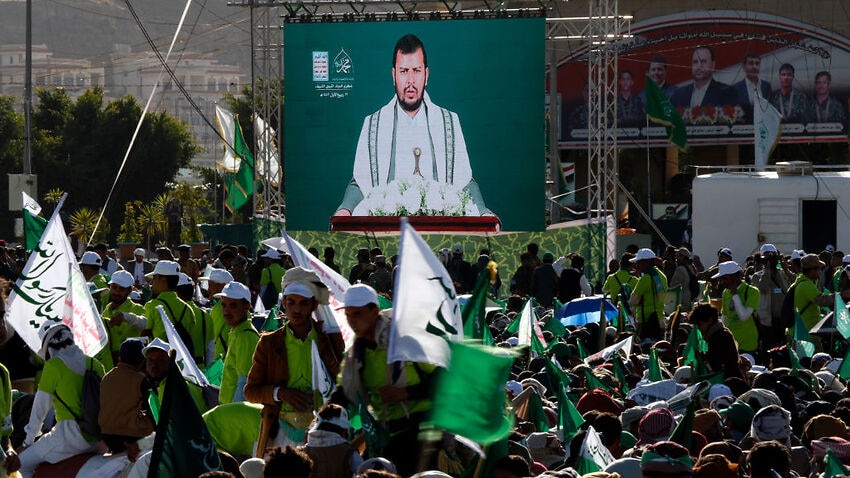Yemen’s Iran-backed Houthis have condemned the United States’ move to brand the rebels as a terrorist organisation and say they reserve the right to respond.
“These policies represent a crisis in thinking and are to be condemned, and we have the right to respond,” Houthi political commander Mohamed Ali al-Houthi said in a tweet.
“The Yemeni people don’t care about any designation from (US President Donald) Trump’s administration as it is a partner in killing Yemenis and starving them,” he added.
US Secretary of State Mike Pompeo has labelled Houthi rebels as terrorists, a last-minute move in defiance of aid groups who fear it will worsen a humanitarian crisis.
Unless Congress blocks the decision, the Houthis will be blacklisted on 19 January – one day before the inauguration of President-elect Joe Biden, whose aides had hoped to mount a fresh push to end Yemen’s devastating six-year-old war.
Mr Pompeo’s action could complicate Mr Biden’s promised efforts to restart diplomacy with Iran and to reassess the US alliance with Saudi Arabia, which has led a bloody offensive in its impoverished southern neighbour.
“The designations are intended to hold Ansar Allah accountable for its terrorist acts, including cross-border attacks threatening civilian populations, infrastructure and commercial shipping,” Mr Pompeo said in a statement late Sunday, using the official name of the Houthi movement.
The Houthis have “led a brutal campaign that has killed many people, continues to destabilise the region and denies Yemenis a peaceful solution to the conflict in their country,” he added.
Mr Pompeo also designated as terrorists three leaders of the movement, including their chief.
He pointed to a 30 December attack on an airport in Yemen’s second city Aden, which killed 26 people and was blamed by the Saudi-backed government on the Houthis.
Fears of aid groups
The rebel group has been battling a Saudi-led military coalition since 2015 and now controls much of Yemen, including the capital Sana’a.
The Houthis have hundreds of thousands of fighters under their control and despite years of coalition air strikes against them, they continue to launch drones and missiles towards Saudi cities.
The war is widely regarded as having turned a poor country into a humanitarian catastrophe. Tens of thousands of people, mostly civilians, have been killed and millions displaced in Yemen’s war, with most of the nation dependent on some form of aid to survive.
The group is already under US sanctions but Houthis’ designation as a terrorist group is expected to scare away outside actors from many transactions with Houthi authorities, including bank transfers and buying food and fuel, for fear of US prosecution.
Aid groups have warned Mr Pompeo against the blacklisting of the Houthis, saying that they have no option but to deal with what is the de facto government in northern Yemen.
“We must be able to negotiate access for our aid and protection of civilians with all sides to all conflicts. Our humanitarian work must not be criminalised,” Jan Egeland, secretary general of the Norwegian Refugee Council, said in November.
Mr Pompeo insisted that the State Department was aware of the concerns and would work with non-governmental groups and the United Nations to ensure that aid goes through.
“We are planning to put in place measures to reduce their impact on certain humanitarian activity and imports into Yemen,” Mr Pompeo said.
President Donald Trump’s administration has been ramping up pressure on Iran in its final days, hoping to make it more difficult logistically and politically for Mr Biden to ease sanctions as he seeks a return to a nuclear agreement.
US officials and analysts say that Iran has armed the Houthis, with which the Shiite clerical state has religious kinship, but some experts question the extent of cooperation and see Tehran primarily as interested in bogging down Saudi Arabia, whose brutal air campaign has included strikes on civilian targets.
Mr Pompeo issued the statement shortly before midnight on a Sunday. Under US law, Congress has seven days in which it can object to a designation of a foreign terrorist group.
But Congress will likely be focused on other issues, as the House of Representatives looks at impeaching President Trump for a second time after he encouraged a mob that on 6 January stormed the Capitol to disrupt a ceremonial session that certified Mr Biden’s election victory.
Lawmakers from Mr Biden’s Democratic Party had already told Mr Pompeo that the step would both jeopardise aid and peace efforts.
“This designation would almost certainly prevent the critical delivery of food, medical supplies and other items necessary to combat both Covid-19 and famine,” said a joint appeal late last year by three senators – Democrats Chris Coons and Chris Murphy and Republican Todd Young.
In an open letter to Mr Pompeo last month, retired US diplomats, including six former ambassadors to Yemen, also doubted that the Houthis met the legal definition of a terrorist group.
“In fact, designating the Houthi movement will be perceived as politically motivated and will undermine the credibility of US counterterrorism programs and policies, which serve as a first line of our nation’s defence,” they wrote.
Mr Pompeo – who met Friday for the first time with his designated successor, Antony Blinken, after Mr Trump begrudgingly acknowledged his election loss – has been moving forward on a series of major decisions as the clock ticks on his tenure.
The Secretary of State on Saturday eased restrictions on US officials’ interactions with Taiwan and has indicated that he wants to return Cuba to a list of state sponsors of terrorism.
With Reuters








